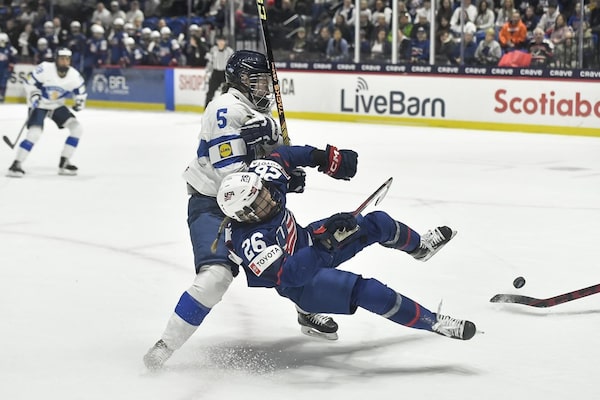
United States forward Kendall Coyne Schofield (26) is tripped by Finland defensewoman Siiri Yrjola (5) during the second period in the semifinals at the IIHF women's world hockey championships in Utica, N.Y., Saturday, April 13, 2024. Yrjola was called for holding on the play. (AP Photo/Adrian Kraus)Adrian Kraus/The Associated Press
One of global sports’ and women’s hockey’s fiercest and longest-running rivalries – United States versus Canada – is adding yet another chapter at the world championships.
The bordering nations and women’s hockey super powers will meet for gold on Sunday for the 22nd time in 23 tournaments since the championships were established in 1990.
The defending champion Americans advanced on Saturday with a 5-0 win over Finland, in an outing Laila Edwards scored a natural hat trick and Aerin Frankel stopped 15 shots to set a single-tournament record with her fourth shutout.
The Canadians followed with 4-0 win over Czechia, more widely known in English as the Czech Republic. Emily Clark and Jocelyne Larocque had a goal and assist each, and Ann-Renee Desbiens stopped nine shots for her second shutout of the tournament.
With the Americans clinching their berth first, forward Taylor Heise had no preference over who they faced.
“It doesn’t matter what team, it doesn’t matter what time, it doesn’t matter where we play. We could be playing outside for all I care,” Heise said. “We’re going to come out hard either way.”
And yet, even in a tournament where the Czechs, Finns and Germany displayed signs of beginning to close the competitive gap, the U.S.-Canada matchups tend to generate the most memorable games. And that includes a physical, fast-paced, end-to-end preliminary round matchup on Monday, which the Americans won 1-0 on Kirsten Simms’ overtime goal.
Edwards joins Simms in being among the four U.S. players making their tournament debuts.
“She stepped up in a way that not a lot of people can. And I’m very proud of her,” said Heise, who set up Edwards’ final two goals. “I’m glad that she could prove that to herself. Because sometimes when you’re young and you get picked to a team like this, sometimes it takes a goal like that to prove to yourself that you’re here for a reason. But we all knew that before.”
The six-foot-one Edwards is from Cleveland and the first Black hockey player to make the U.S. national team roster. Coming off her sophomore season at Wisconsin, she is one of four Americans making their tournament debuts and now has five goals to share the tournament lead with teammate Alex Carpenter.
“It’s pretty good, I’d say,” Edwards said of her growing confidence. “Just confident in the team. So that always helps with my individual confidence. When our team’s rolling and everyone’s playing at their best and sharing the puck and just doing all sorts of things really helps with my confidence.”
Hannah Bilka and Savannah Harmon also scored for the Americans, who kept their perfect run intact in having appeared in every world championship final since the tournament was established in 1990.
The two women’s hockey global powers have met in 21 of 22 world tournament finals, with the only exception 2019, when host Finland beat Canada in the semis before losing to the U.S. in a 2-1 shootout.
The Americans, who beat Canada in last year’s final 6-3, have won 10 world gold medals to Canada’s 12. The U.S. is 18-17 overall against Canada in tournament play, with both teams scoring 98 goals against. Canada, meantime, has the edge in Olympic play in having won five gold medals to the Americans’ two.
Sanni Ahola finished with 50 saves in a game Finland was outshot 55-15, played before a predominantly loud “USA! USA!” chanting crowd in central New York.
“We battled hard, but the U.S. were very good,” Ahola said. “They were very strong and fast, so we’re trying to survive. We didn’t have that many chances, but we should have used them better.”
In the second semi-final, Canada led 2-0 after the first period on goals by Larocque and Blayre Turnbull. Sarah Fillier rounded out the scoring for the Canada (5-1), which also beat Czechia 5-0 in the preliminary round.
Klara Peslarova stopped 43 shots for the Czechs, who have a chance to win their third consecutive bronze medal.
Earlier in the day, former Northeastern University star and member of PWHL Boston, Alina Muller scored 4:07 into overtime in Switzerland’s 3-2 win over Germany in a placement-round game. The win secures Switzerland maintaining a spot among the top five nations in the A Group, while Germany stays in the five-nation B Group entering next year’s world championships.